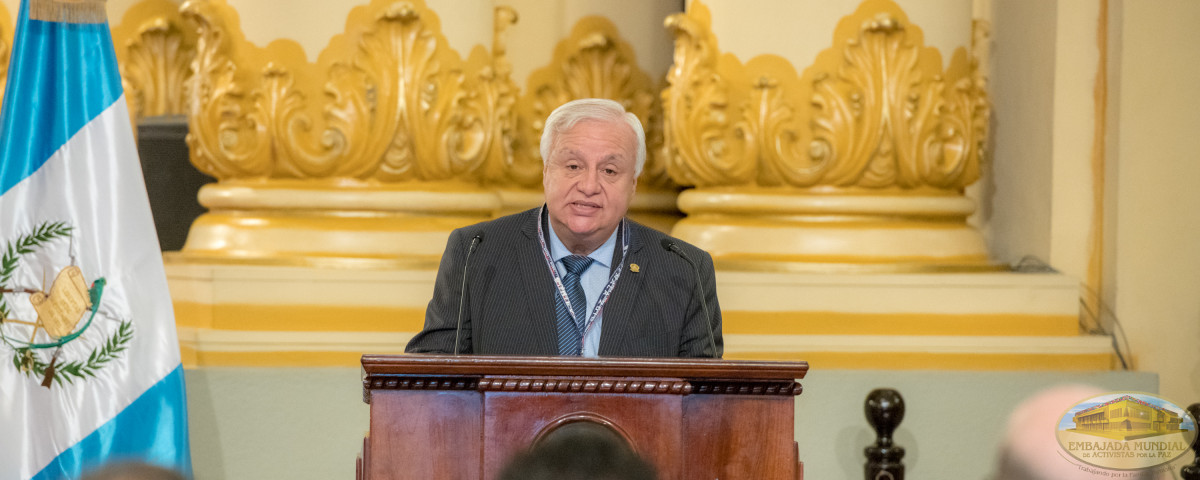
Dr. Oscar Cóbar | Words in opening ceremony, Session Science, CUMIPAZ 2018
Related Video:
Transcription note: The text below was typed and reviewed live, during the transmission of the lecture and/or translation. It is possible that this lecture is in the process of subsequent revisions for its improvement. If required, it can be verified with the corresponding recording. (Suggestions or comments: transcripciones@emapaz.com)
Dr. Oscar Cobar
Representative of the National Department of Science and Technology SENACyT
Gabriela Lara, General Director of the Global Embassy of Activists for Peace; Dr. Rajendra Pachauri, 2007 Nobel Peace Prize Laureate; Mr. Dimitri Kharakka, Representative of the United Nations Permanent Forum of Indigenous Peoples. We wish that Dr. William Soto Santiago, Executive President of the Global Embassy of Activists for Peace, recovers soon; Dr. Manuel Diaz, moderator of this table; distinguished panelists, government authorities, international and national organization leaders, national and international scholars that honor us with their presence, honourable diplomatic body, the media, special guests, friends, and everyone.
If we understand peace as those processes that contribute to the satisfaction of human needs in conditions of equality and sustainability, it is without doubt that science and technology play an important role in its development. For that to become a reality in our country, we need to build a scientific culture, bring science closer to society, convey the necessary knowledge in order for them to understand their environment, understand social issues, and be capable of proposing viable alternative solutions and choose options for social and economic development as a vision towards the future.
Today, not only our country, the inherent issues of under development (such as food security, and weak prevention and answers to climate change effects, health systems, and limited education, among others, can all be resolved gradually, if we design public policies based on scientific knowledge and we use science, technology, and innovation as key parts in our development.
We are advancing in Guatemala, thanks to the support of the President of the Republic, and especially to the Vice President, Dr. Jafeth Cabrera, who is the President of the Council of Science of Technology.
We have, based on our National Science and Technology Policy, a strategic plan for scientific and technological development 2018-2025: 13 new lines of financing to finance strategic activities of high level human resources formation, generation of scientific knowledge, entrepreneurship innovation, development and transfer of technology, and popularization of science; all this to strengthen our scientific and technological infrastructure, create an ecosystem of innovation and a scientific culture in the country.
The topics of education, children and youth, gender, and disability, as well as the recovery and validation of the traditional knowledge of our indigenous nations and the environment, are transversal themes.
Let us generate instead of importing technologies, let us transform our production system into one based on technology, with innovation as its motor for development; let us use the scientific infrastructure and human resources of our universities to create synergies, let us motivate the private sector to innovate in their processes, let us link universities in our productive processes, and as a country let us orient our resources in financing projects that give answers to issues with a regional vision, and let us consolidate our scientific potential.
I want to end, full of hope,and convinced that we are on the right path, with the words of Albert Einstein, who said at a given moment, “He who has never made a mistake, has never tried anything new.”
Let us continue forward. Thank you.
Moderator
Well, we thank, Dr. Oscar Manuel Escobar, National Secretary of Science and Technology (SENACyT), in representation of the Government of Guatemala.
We want to thank the governor for his hospitality yesterday, who is with us today in this beautiful Palace. Also, the ministers and high authorities of the Government of Guatemala who honor us with their presence.
Without doubt, we are warming up our engines; CUMIPAZ has begun with that passion of loving nature, of understanding that it is a spiritual ecology for the integrality and management in order to achieve human peace and happiness; all those supplements, all those values that have been materializing in CUMIPAZ.
Today, we have the honor of introducing for the first time, (we are truly honored with his presence) Mr. Dmitri Kharakka-Zaitsev. He has a PhD in Law; he currently works as an acting lawyer. Dimitri is a member of the regional National-cultural Autonomy of Ingrian Finns, and member of the Izhora “Shojkula” Indigenous Community Board. He has a wide experience in indigenous topic and interrelations with authorities at various levels. Since 1995, he has dedicated himself to activities that protect national minorities, and the defense of indigenous rights, the environment of indigenous life, the support and development of language and indigenous peoples cultures. Today, he is with us as Co-Vice President of the Permanent Forum of the United Nations. Welcome, Kharakka.